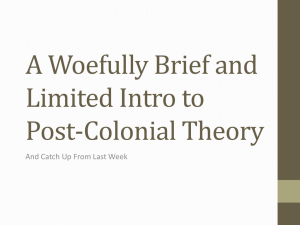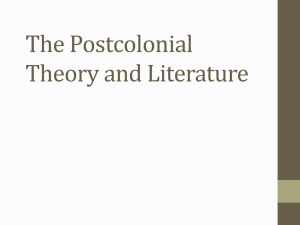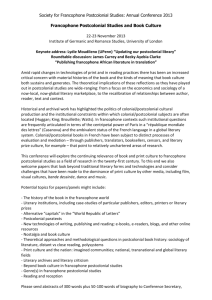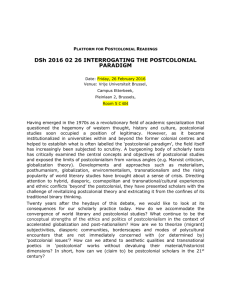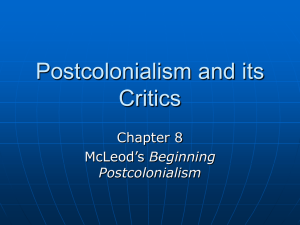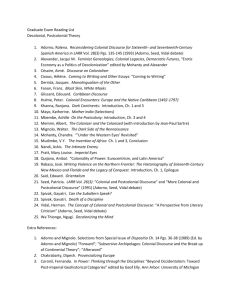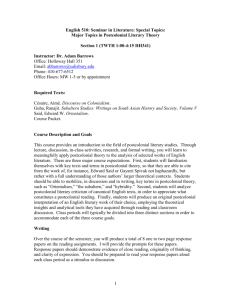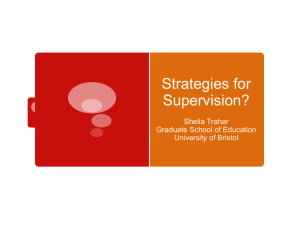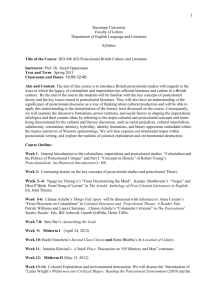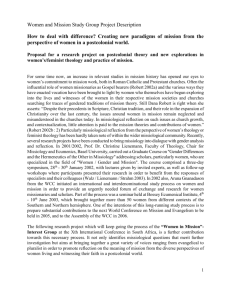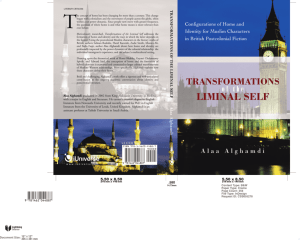Abstracts
advertisement
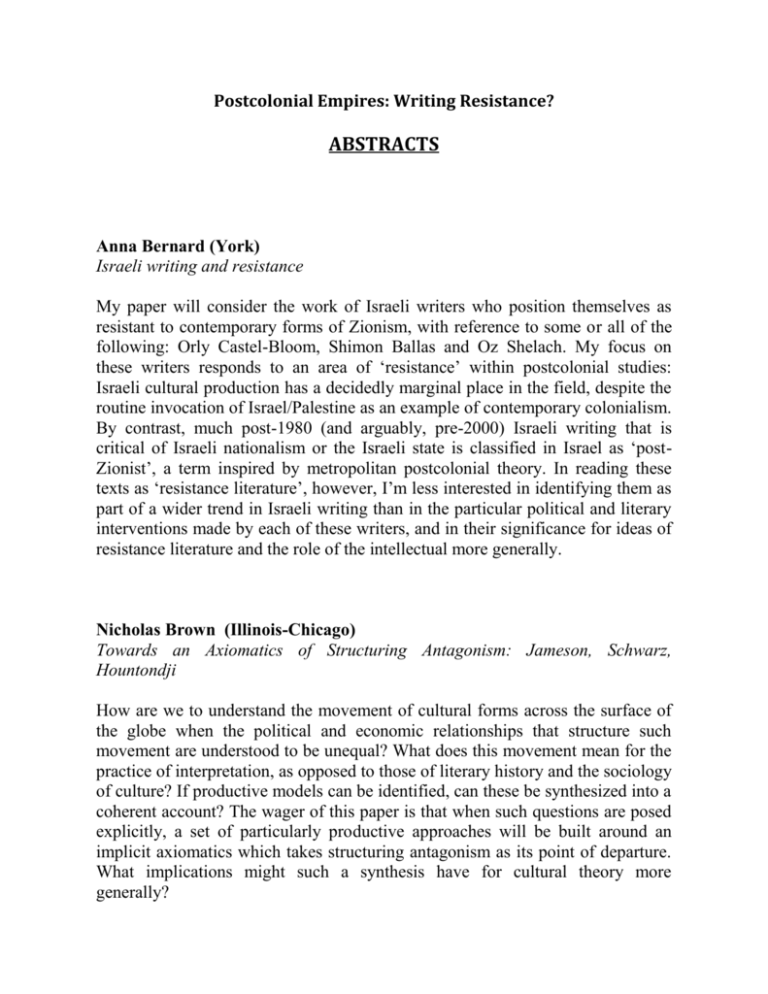
Postcolonial Empires: Writing Resistance? ABSTRACTS Anna Bernard (York) Israeli writing and resistance My paper will consider the work of Israeli writers who position themselves as resistant to contemporary forms of Zionism, with reference to some or all of the following: Orly Castel-Bloom, Shimon Ballas and Oz Shelach. My focus on these writers responds to an area of ‘resistance’ within postcolonial studies: Israeli cultural production has a decidedly marginal place in the field, despite the routine invocation of Israel/Palestine as an example of contemporary colonialism. By contrast, much post-1980 (and arguably, pre-2000) Israeli writing that is critical of Israeli nationalism or the Israeli state is classified in Israel as ‘postZionist’, a term inspired by metropolitan postcolonial theory. In reading these texts as ‘resistance literature’, however, I’m less interested in identifying them as part of a wider trend in Israeli writing than in the particular political and literary interventions made by each of these writers, and in their significance for ideas of resistance literature and the role of the intellectual more generally. Nicholas Brown (Illinois-Chicago) Towards an Axiomatics of Structuring Antagonism: Jameson, Schwarz, Hountondji How are we to understand the movement of cultural forms across the surface of the globe when the political and economic relationships that structure such movement are understood to be unequal? What does this movement mean for the practice of interpretation, as opposed to those of literary history and the sociology of culture? If productive models can be identified, can these be synthesized into a coherent account? The wager of this paper is that when such questions are posed explicitly, a set of particularly productive approaches will be built around an implicit axiomatics which takes structuring antagonism as its point of departure. What implications might such a synthesis have for cultural theory more generally? Keya Ganguly (Minnesota) Nostalgia for the Future: The Bombay Social Film of the 1950s. The critique of empire expressed in this era's progressive films (I will focus on Bimal Roy's works) have a dual orientation, looking back in time but also forward, in what the intellectual historian Reinhart Koselleck termed a "future past." My argument rests on exploring how -- in the decade immediately following India’s independence from British rule -- a democratic and egalitarian vision of the new nation was consolidated in a mass popular idiom whose feeling-tone was nostalgic but whose orientation was futural. In formulating an outlook that cuts against the grain of conventionally accepted notions about the impossibility of political art on the one hand, and the non-viability of the state, on the other, the social film provides us with coordinates for reconceptualizing the category of resistance along the lines of a "long revolution." Barbara Harlow (Texas,Austin) Extraordinary Renditions: Or Where in the World is Guantánamo? Variously decried as a “legal black hole” or a “law-free zone” and heralded as “honor bound to defend freedom,” the small territorial space at the southern tip of Cuba currently managed by the US as a rental space for holding “enemy combatants,” will soon be closed – at least if the Obama administration should eventually keep its word. In the meantime, however, Guantánamo has opened an important literary and critical space in renditions almost as “extraordinary” as those secret flights and alternative black sites maintained by US security agencies and their corporate affiliates and national allies. This discussion proposes, then, to examine the emergent corpus – memoirs by detainees and lawyers, as well as novels (whodunits and young adult alike), theater and film – of another Guantánamo, in writing, that is proposing variously indexed cartographies and historiographies that just might yet yield some revised coordinates in answering the question of “where in the world is Guantánamo”? David Johnson (Open University) Representing the ‘boa gente’ of Mozambique, from Camões to Mbeki: precolonial forms of address, postcolonial forms of imperialism. In a speech to the Mozambican Assembly on 2 May 2002, the South African president Thabo Mbeki described Vasco da Gama’s landing on the 11th January 1498 at the mouth of the Inharrime River on the Mozambique coast. According to Mbeki, Da Gama encountered such friendly people there that he named the place Terra da Boa Gente, the Land of Good People. Mbeki continued his speech by observing that landing in Mozambique 504 years later, he too found himself among boa gente. Mbeki’s curious identification with Da Gama is the point of departure, as the paper uses his tribute to Mozambicans as boa gente to examine briefly three moments of colonial and neo-colonial history: (1) the Portuguese literary (Camões) and chronicle (Barros) descriptions of pre-colonial encounters between Portugal and East Africa in the fifteenth century; (2) the British rewritings of Portuguese versions of colonial exploration and plunder in the late eighteenth century (principally the work of W. J. Mickle, but also Robert Southey and William Robertson); and (3) the post-apartheid discourses and narratives reconfiguring the relationship between South Africa and Mozambique. From these many re-writings of this particular historical encounter, general observations are ventured about the relationship between discursive representations on the one hand, and military violence, economic exploitation, and political subordination on the other. The Conclusion reflects upon the disabling effect of positive discursive representations – like boa gente – and argues that strategies of resistance should always register the military/economic/political interests framing discourses of culture, literature and history. Elleke Boehmer (Oxford) Gandhi, Nehru and Mandela: resistance practice into theory In the presentation I'd look at how anti-colonial practice organises and refines idea of anticolonial resistance, especially in situations of continuing empire,and how these ideas are further developed through being translated across different spaces of freedom struggle. Mukul Kesavan (Jamia Millia) Bad Terms: how hand-me-down words mislead post-colonial nations Self-determination, secularism and secession along with nation, state, language, community and people, are words that shape argument and political reality every day in south Asia. We have seen the power of these words most recently in the bloody resolution of Sri Lanka's civil war, but arguments about national identity have racked Sind, Kashmir, the Indian North-East and India as a whole since 1947. The influence of second hand words in third world countries hasn't merely created bad agendas, it has obscured much that is original and interesting in postcolonial politics. Taking republican India as an example, I try to illustrate the need to domesticate our political vocabulary. Timothy Brennan (Minnesota) On the Post-Political "On the Post-Political," explores actual examples of the state of debate in our circles these days (or rather, the lack thereof), considers current definitions of "right" and "left," and tries to explore the virtues of polemic -- that is, what kind of knowledge is possible by way of polemic's intellectual agon in a world of negotiation and consensus, and the way that authors are dismissed for being polemical, when they are technically not so at all -- only not genealogical. Crystal Bartolovich (Syracuse) Live Locally, Choose Globally On the new "recipe" books for global transformation (Singer, Sachs, Bhaghwati, etc), (more narrowly) the ideology of "choice" in the liberal/right visions of globalization, or the role of eco-materialism in a globe where right and liberal discourse increasingly hijack "Green" discourse. Benita Parry (Warwick) Resistance in World Literature These are the matters I will try and address: Because my understanding of colonialism is as a project of capitalism, I refer to one of the central political/theoretical debates of today, and ask whether we are now living in a post-imperialist age, or whether the present dispensation is an intensification, and not a transcendence, of the profound unevenness and inequalities between core and periphery. These positions determine which forms of resistance and radical agency are promoted by critics. Hence I look at the arguments for situating de-politicized subjects engaged in identity struggles (ethnicity, gender, sexuality), and movements centred on women, ecology, peace, human rights, as the proper sites for resistance; and I go on to reiterate the case for planned and organized mass social movements attached to a socialist avant-garde, and able to grasp imperialism as a system, and as David Harvey has put it, ‘to understand but also to create organizations, institutions, doctrines, programs, formalized structures and the like’ Another matter concerns the positive revaluation of reformism which I see as a sign of the waning of revolutionary affect amongst a large constituency which would identity itself as radical. I will then ask why questions of violence and terror have not been adequately addressed in the postcolonial discussion since these were present in anti-imperial struggles. I end by looking at discursive resistance to imperialism and suggest that this must include the programmes of Marxist-orientated liberation movements, and because my focus is on imperialism as a world-system, can be found in literatures written before and after the age of liberation movements. David Attwell (York) Archival Resistance and Resistance Literature. Why, in postcolonial studies, is there an inverse proportionality between archival scholarship into the histories of national literatures, and the claims that are made on behalf of these literatures by theorists and critics of literary resistance? The more militant the claims, frequently the less supported they tend to be by archival research. This paper will tease out some of challenges of reading the archive of a national resistance literature, in order to tilt discussion towards nuanced notions of resistance which embrace contradiction and address the nature of writing, the constraints of genre and the difficulties of positionality. Robert JC Young (NYU) The Right to Resist I want to address the question of writing resistance by asking, what gives us the right to resist? Within postcolonial theory, resistance as a category and as a practice is celebrated but less often interrogated. This leaves open the question of whether resistance forms a valid political practice in any context or power structure, and whether all forms of resistance are equally acceptable. Is there a domain of the ethics of resistance? On what basis do we have the right to resist, and, following that, does this right authorise all forms and means of resistance? How can we construct an ethics of resistance that distinguishes between democracy, dictatorship, colonial rule and the forces of globalization? Historically anti-colonial struggle has embodied a tradition in which such questions have always been debated, beginning in Ireland in the nineteenth century, where Daniel O’Connor developed an ethical argument for ‘moral force’ as opposed to ‘physical force’ in response to British rule. The Irish nationalist movement subsequently provided a full spectrum of resources for resistance for other contemporary anticolonial, as well as feminist, struggles. In the twentieth century, the contradictions of the ethics of the right to resist were best represented by the figures of Gandhi and Fanon. In this paper, I wish to interrogate the history of the anticolonial movements from the perspective of their ethical stance with regard to different modes of resistance, and reflect on ways in which these divisions continue to be played out in contemporary global struggles. In this respect, postcolonial theory is uniquely positioned to articulate an ethical framework for the right to resist.
